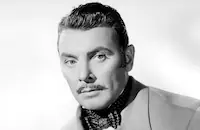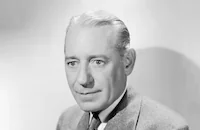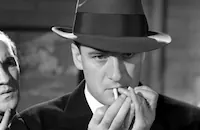Racket Busters

Brief Synopsis
Cast & Crew
Lloyd Bacon
Humphrey Bogart
George Brent
Gloria Dickson
Allen Jenkins
Walter Abel
Film Details
Technical Specs

Synopsis
Hugh Allison, a lawyer with a reputation for putting gangsters in jail, is asked by the city to break up the trucking rackets. In response to his appointment, the racketeers, led by John Martin, crack down on the truckers, using brutal attacks to force them to join their organization. Allison runs into resistance, however, when he interviews the restaurant and business owners that are the victims of the racketeers. No one wants to speak out against the gangsters. Skeets Wilson and Denny Jordan are partners in a small trucking business. They are holdouts against the Martin organization, but when Pop, the owner of the garage, is beaten by the gangsters, Skeets decides to leave the trucking business and sell tomatoes. Soon Denny is the target of attacks. After his pregnant wife Nora is threatened, Denny sends her to the country for her safety. Because his business has been ruined by the gangsters, Denny steals money from the trucking association to pay for her lodging. That night when he returns home, he finds Martin's men waiting for him. They tell him he can keep the money but he must join their organization, and he finally gives in to their demands. Allison questions Denny, but he refuses to tell him anything. When Pop is killed by the gang, Nora tells Denny that he is in the wrong and has lost her respect. Allison arrests Denny, and when he will not testify against the gang he is sent to jail. Martin sends the truckers out on strike in order to close down the market and a city-wide food shortage results. Skeets intervenes and is shot and killed after he rouses the truckers against the gang. Denny witnesses the murder and can no longer stand aside. He sees Martin escaping and helps to capture him. He finally agrees to testify and his courage sets an example for the other men, with the result that Martin is sent to jail.

Director

Lloyd Bacon
Cast

Humphrey Bogart

George Brent

Gloria Dickson

Allen Jenkins

Walter Abel

Henry O'neill

Penny Singleton
Anthony Averill
Oscar O'shea

Elliott Sullivan

Fay Helm
Joe Downing
Norman Willis
Don Rowan
Mary Currier
Wedgwood Nowell
Bruce Mitchell
Jack Goodrich
James Nolan
Egon Brecher
Paul Irving
Jim Pierce
Ethan Laidlaw
Herbert Heywood
Eddy Chandler

John Ridgely
Alan Davis
Don Turner
George Lloyd
Jack Kenny
Joe Devlin
Dick Wessel
Dick Rich
Bob Perry
Lew Harvey
Jimmy O'gatty
Jack Gardner

Irving Bacon
Jack Wise
John Dilson
Vera Lewis
Frank Jaquet
Joseph Destefani
William Gould
Jan Holm
Ed Stanley
Gordon Hart

Jack Mower
Cliff Saum
Robert Strange
Harvey Clark
Harrison Greene
Nat Carr
Monte Vandergrift
Ferris Taylor
Georgie Cooper
William Crowell
Cecil Weston
Jean Maddox
Loia Cheaney
Crew
Leonardo Bercovici
Sam Bischoff
Adolph Deutsch
Warren Duff
Arthur Edeson
Leo F. Forbstein
James Gibbon
Esdras Hartley
Mark Hellinger
Robert B. Lee
Dick Mayberry
Robert Rossen
Howard Shoup
Jack L. Warner

Photo Collections
Film Details
Technical Specs

Articles
Racket Busters
Directed by Warner Bros. stalwart Lloyd Bacon, Racket Busters (1938) is a fast-paced, street-smart melodrama, the kind in which Warners excelled. Co-written by Robert Rossen, who would eventually become a director himself, making films such as All the King's Men (1949) and The Hustler (1961), the film is actually a glorified B-movie programmer, but it never takes itself too seriously and doesn't forget that it's telling a simple story of a decent man struggling to do the right thing.
This was the third time Bogart and director Lloyd Bacon worked together; they made a total of seven pictures together including this one and Marked Woman (1937), San Quentin (1937), The Oklahoma Kid (1939), Invisible Stripes (1939), Brother Orchid (1940), and Action in the North Atlantic (1943). Bogie, no doubt chaffing under the assembly-line parts assigned him by Jack Warner, appears to accentuate his famously stiff lip even more here, perhaps in reaction to the cliché-ridden dialogue. While Bogart confided to friend and biographer Richard Gehman in the book Bogart that the cast of Racket Busters was better than the usual for the pictures he made during this period, he still lambasted the effort by saying that, "I made so many pictures like that, I used to get the titles mixed up. People would ask me what I was working in, and I'd have to think about what it was called." Regardless of the film's humble goals, the top-billed Bogart makes the most of the part. He walks into a market with a cocky swagger that suggests he already owns the joint. It's fun to watch him. In contrast, the good guys, as embodied by Walter Abel (of whom the industry trade paper Variety noted the similarities with real-life racket buster Thomas E. Dewey), are stolid and authoritarian. The message seems to be crime never pays, but it's a lot more fun than being good.
Variety reviewed the film as "just another gangster picture...but one which attempts a note of authenticity by assuring audiences through a foreword that it is based on court records and other data in connection with the trucking racket in New York City." Film Weekly noted the story "is told tersely and forcefully" with "a strong element of suspense all through...If you're not completely tired of gangster stuff, you'll enjoy this film. It has pace, realism and vigor."
Producer: Samuel Bischoff, Hal B. Wallis, Jack L. Warner
Director: Lloyd Bacon
Screenplay: Leonardo Bercovici (story), Warren Duff, Robert Rossen
Cinematography: Arthur Edeson
Film Editing: James Gibbon
Art Direction: Esdras Hartley
Music: Adolph Deutsch
Cast: Humphrey Bogart (John Martin), George Brent (Denny Jordan), Gloria Dickson (Nora Jordan), Allen Jenkins ('Skeets' Wilson), Walter Abel (Hugh Allison), Henry O'Neill (Governor).
BW-72m. Closed captioning.
by Scott McGee

Racket Busters
Quotes
Trivia
Notes
An onscreen introduction reads, "Based upon official court records of the special rackets prosecution of the trucking racket in New York City." According to a news item in Hollywood Reporter, the title was changed to Threat Over the City for release in Paris so that the tennis-mad Parisians would not think the film was about their favorite sport.

Miscellaneous Notes
Released in United States 1938
Released in United States 1938














